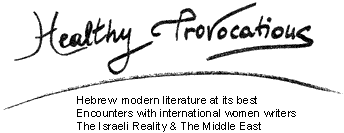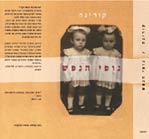 |
Corinna Hasofferett leads you astray |
 |
||
Index
In Translation:
|
CommentaryTuesday, November 04, 2003The NoNovel Is NudeIt all started with Phillip Win’s last post on NaNoWriMo, the acronym of the prestigious title (everything with National in it deludes us to greatness), ‘National Novel Writing Month’. Following my comments over there, I know I have yet to unburden my heart. So even if I am not able to write fifty thousand words in one month, as the rules of the game over there are, not even in Hebrew, l'll have to do with less, much less. But in literature less is more. Says initiator Chris Baty: “…the ONLY thing that matters in NaNoWriMo is output. It's all about quantity, not quality. The kamikaze approach forces you to lower your expectations, take risks, and write on the fly.” Why call it a novel? Isn't literature about raising your expectations, about quality? About taking risks, yes, but never the risk of making do without quality. I am a published writer. Frankly, this program insults Literature: “Valuing enthusiasm and perseverance over talent and craft, NaNoWriMo is a novel-writing program for everyone who has thought fleetingly about writing a novel but has been scared away by the time and effort involved.” I know well that you can with less effort shake off your fears by having a friend hug you while you tremble terribly... Or even more often by hugging your fear and pain yourself, and let go. I write slowly, edit and re-edit, asleep and awake. Since words count, one by one, there is no need to count them. Better write an excellent book thirty years (as was the case with my fourth book), than rush. Words cannot be rushed, they come at their own seemingly capricious pace. It does not mean that one cannot write a book in a very short period. It does happen but then not because one has set a marked goal of 2000 words a day. Only because the story has kept you awake. For me literature and writing it are sacred ground. I feel that this venture is belittling my holly of holiest, turning writing into a technique, a most mundane one, profane. NaNoWriMo informs us (aided by a teacher’s testimony), that it could be an excellent educational tool. But how can it be so when the emphasis is on quantity, not on quality content, when it embraces the same superficiality the student has already internalized from long TV watching hours, cheap movies, (violent) action video games, and yes – the industry of commercial non-books? Literature is suggestive; it leaves many empty lines between each word, where your imagination as a reader comes to wet its thirst and you grow daily. If you have an important story to tell the world, if you cannot sleep well at night if you do not write it down, then you'll write it, come what. But will you write that intensely when you come to it with the acquired habits of a monitor, will you be able to shed them off and listen to the story alone? A non-invasive motivator is when a parent and/or a teacher reads a story, a few lines, or a full notebook you've written, and encourages you with enthusiasm, with no criticism whatsoever. This was my father's and, later on, my teachers' attitude. In school in Israel, at age thirteen and with no Hebrew, we were given each day some ten or twenty new words (picked from a story she's been reading us patiently) and invited to bring next day a story made up of those words. The encouragement, enthusiasm and loving support she expressed when listening to us read them the following day, built our self-confidence. We are living in The Age of Instant Gratification, which I abhor, as it enables redundancy and alienation from our creative forces. Those cannot ever be tamed into a calculated schedule. Let them loose and they'll flourish and enrich, spiritually, both writer and reader. I sit at the computer and write until I feel suddenly that I'm exhausted. I write sitting or standing in buses, in lines, in the middle of the street. There is always a pen and a small notebook in my handbag, at my bedside - but I might be writing also on the back of a ticket or a on scrap of paper. I do not care for the number of words, on the contrary, I always fear there are too many of them. Then why scribble? Says Mr. Baty: The reasons are endless! To actively participate in one of our era's most enchanting art forms! To write without having to obsess over quality. To be able to make obscure references to passages from your novel at parties. To be able to mock real novelists who dawdle on and on, taking far longer than 30 days to produce their work. Well, these are most important goals in life... As a writer, and as a discerning reader, I care for the insightful truth, for the rare moments of inspired revelation. Will you encounter them when you're intent on running, and in the wrong direction? If the goal is Support, what support can one gain for a program that counts words and counts down time? If the goal is incentive, a push to make you sit down and write – I beg to differ: Ours is not a broken car's engine in need to be pushed a bit to get started. By Support I mean the building of self-confidence. It won’t hurt though to have in adulthood an intelligent and compassionate friend. Is such a friend a must in order for a writer to gain self-confidence? Please remember Kafka was that much lacking in it that he asked his close friend, Max Brod, to destroy his unpublished manuscripts after his death, a will that, luckily, Brod disobeyed. At the end of the day, or the thirty days spelled out in that program - you're back to square one - you, the pages and the void. I see writing, creativity, as a great responsibility, a commitment. That we shoulder it individually is a great burden; on the other hand, look what it does to us: it gives voice to our unique existence, and in the most selfless form of expression. 0 comments 0 Comments: |


|
|||||||||
| This page and all its contents (except the interviews and reviews) are copyright
© Corinna Hasofferett 2002-2004 If you have a problem viewing any page at this site,please let us know by writing to us |
Maabarot Web Design-MWD |